Evidence for Nursing: Systematic Literature Search Strategy
VerifiedAdded on 2023/01/17
|5
|1716
|91
Homework Assignment
AI Summary
This assignment, titled "EVIDENCE FOR NURSING Assessment Item 1: Finding the evidence," requires students to apply evidence-based practice principles to a clinical scenario. The assignment focuses on developing a focused clinical question using the PICO (Patient/Problem, Intervention, Comparison, Outcome) framework, and then creating a systematic literature search strategy. Students are provided with clinical scenarios, such as managing postoperative pulmonary complications or using compression stockings for stroke patients, to guide their work. They must complete a PICO worksheet, formulate a searchable question, identify relevant search terms, and build a search strategy using Boolean operators. The assignment culminates in performing the search in Embase (Elsevier Platform) and providing a screenshot of the final search. This assessment aims to evaluate students' abilities in formulating structured questions and conducting systematic literature searches, which are crucial skills for evidence-based nursing practice. The assignment emphasizes the importance of alternative search terms and inclusion/exclusion criteria to refine search results.
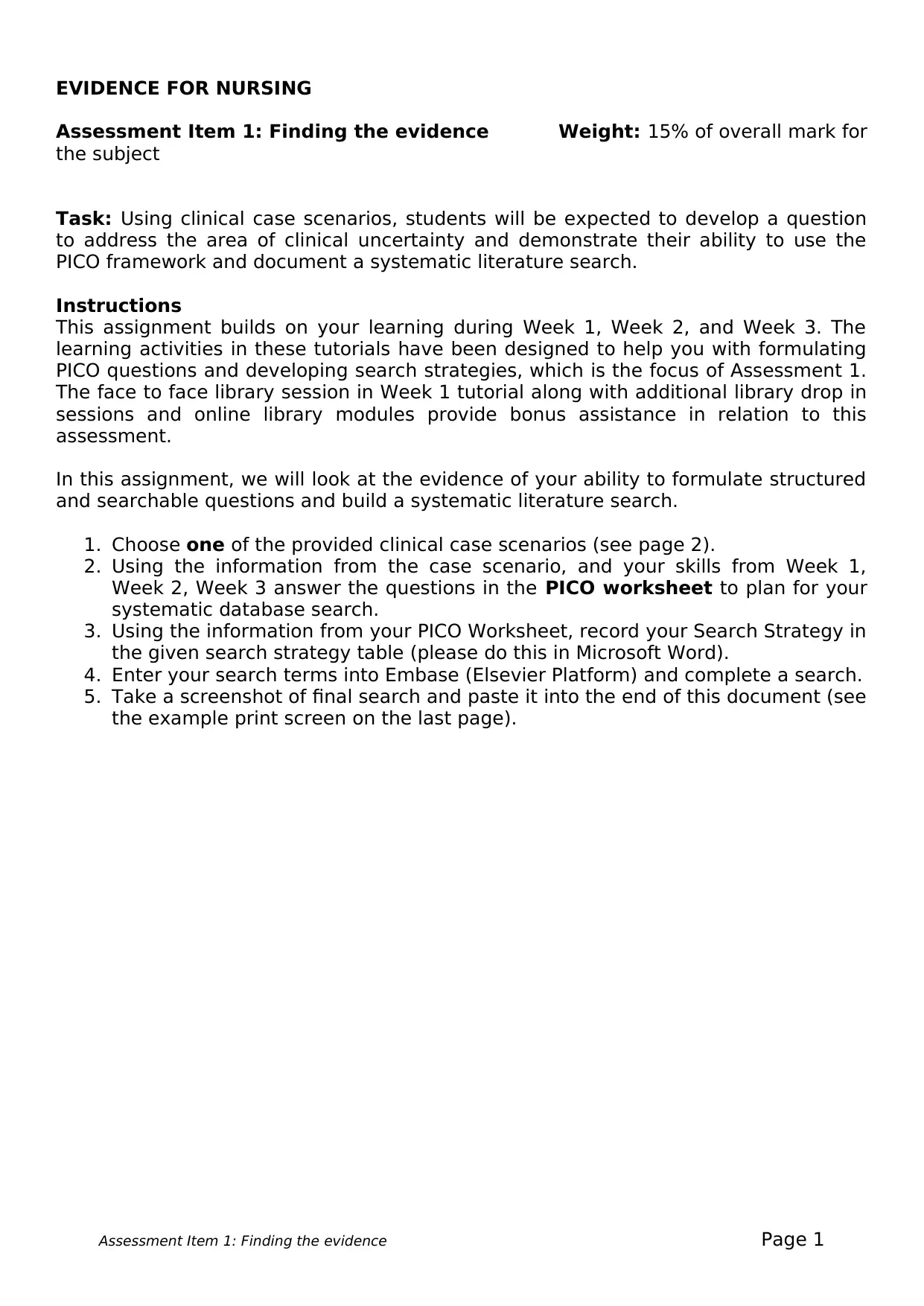
EVIDENCE FOR NURSING
Assessment Item 1: Finding the evidence Weight: 15% of overall mark for
the subject
Task: Using clinical case scenarios, students will be expected to develop a question
to address the area of clinical uncertainty and demonstrate their ability to use the
PICO framework and document a systematic literature search.
Instructions
This assignment builds on your learning during Week 1, Week 2, and Week 3. The
learning activities in these tutorials have been designed to help you with formulating
PICO questions and developing search strategies, which is the focus of Assessment 1.
The face to face library session in Week 1 tutorial along with additional library drop in
sessions and online library modules provide bonus assistance in relation to this
assessment.
In this assignment, we will look at the evidence of your ability to formulate structured
and searchable questions and build a systematic literature search.
1. Choose one of the provided clinical case scenarios (see page 2).
2. Using the information from the case scenario, and your skills from Week 1,
Week 2, Week 3 answer the questions in the PICO worksheet to plan for your
systematic database search.
3. Using the information from your PICO Worksheet, record your Search Strategy in
the given search strategy table (please do this in Microsoft Word).
4. Enter your search terms into Embase (Elsevier Platform) and complete a search.
5. Take a screenshot of final search and paste it into the end of this document (see
the example print screen on the last page).
Assessment Item 1: Finding the evidence Page 1
Assessment Item 1: Finding the evidence Weight: 15% of overall mark for
the subject
Task: Using clinical case scenarios, students will be expected to develop a question
to address the area of clinical uncertainty and demonstrate their ability to use the
PICO framework and document a systematic literature search.
Instructions
This assignment builds on your learning during Week 1, Week 2, and Week 3. The
learning activities in these tutorials have been designed to help you with formulating
PICO questions and developing search strategies, which is the focus of Assessment 1.
The face to face library session in Week 1 tutorial along with additional library drop in
sessions and online library modules provide bonus assistance in relation to this
assessment.
In this assignment, we will look at the evidence of your ability to formulate structured
and searchable questions and build a systematic literature search.
1. Choose one of the provided clinical case scenarios (see page 2).
2. Using the information from the case scenario, and your skills from Week 1,
Week 2, Week 3 answer the questions in the PICO worksheet to plan for your
systematic database search.
3. Using the information from your PICO Worksheet, record your Search Strategy in
the given search strategy table (please do this in Microsoft Word).
4. Enter your search terms into Embase (Elsevier Platform) and complete a search.
5. Take a screenshot of final search and paste it into the end of this document (see
the example print screen on the last page).
Assessment Item 1: Finding the evidence Page 1
Paraphrase This Document
Need a fresh take? Get an instant paraphrase of this document with our AI Paraphraser
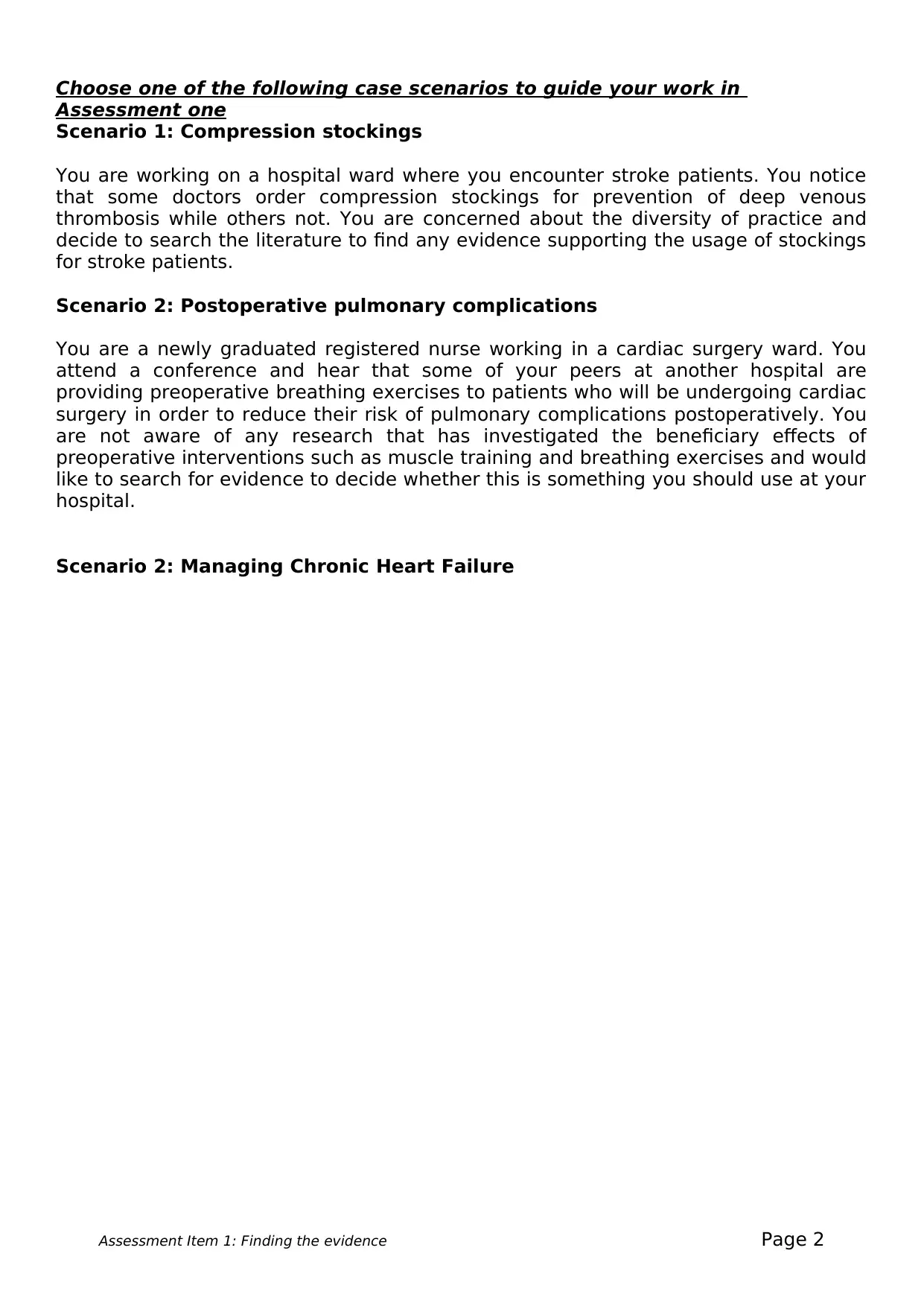
Choose one of the following case scenarios to guide your work in
Assessment one
Scenario 1: Compression stockings
You are working on a hospital ward where you encounter stroke patients. You notice
that some doctors order compression stockings for prevention of deep venous
thrombosis while others not. You are concerned about the diversity of practice and
decide to search the literature to find any evidence supporting the usage of stockings
for stroke patients.
Scenario 2: Postoperative pulmonary complications
You are a newly graduated registered nurse working in a cardiac surgery ward. You
attend a conference and hear that some of your peers at another hospital are
providing preoperative breathing exercises to patients who will be undergoing cardiac
surgery in order to reduce their risk of pulmonary complications postoperatively. You
are not aware of any research that has investigated the beneficiary effects of
preoperative interventions such as muscle training and breathing exercises and would
like to search for evidence to decide whether this is something you should use at your
hospital.
Scenario 2: Managing Chronic Heart Failure
Assessment Item 1: Finding the evidence Page 2
Assessment one
Scenario 1: Compression stockings
You are working on a hospital ward where you encounter stroke patients. You notice
that some doctors order compression stockings for prevention of deep venous
thrombosis while others not. You are concerned about the diversity of practice and
decide to search the literature to find any evidence supporting the usage of stockings
for stroke patients.
Scenario 2: Postoperative pulmonary complications
You are a newly graduated registered nurse working in a cardiac surgery ward. You
attend a conference and hear that some of your peers at another hospital are
providing preoperative breathing exercises to patients who will be undergoing cardiac
surgery in order to reduce their risk of pulmonary complications postoperatively. You
are not aware of any research that has investigated the beneficiary effects of
preoperative interventions such as muscle training and breathing exercises and would
like to search for evidence to decide whether this is something you should use at your
hospital.
Scenario 2: Managing Chronic Heart Failure
Assessment Item 1: Finding the evidence Page 2
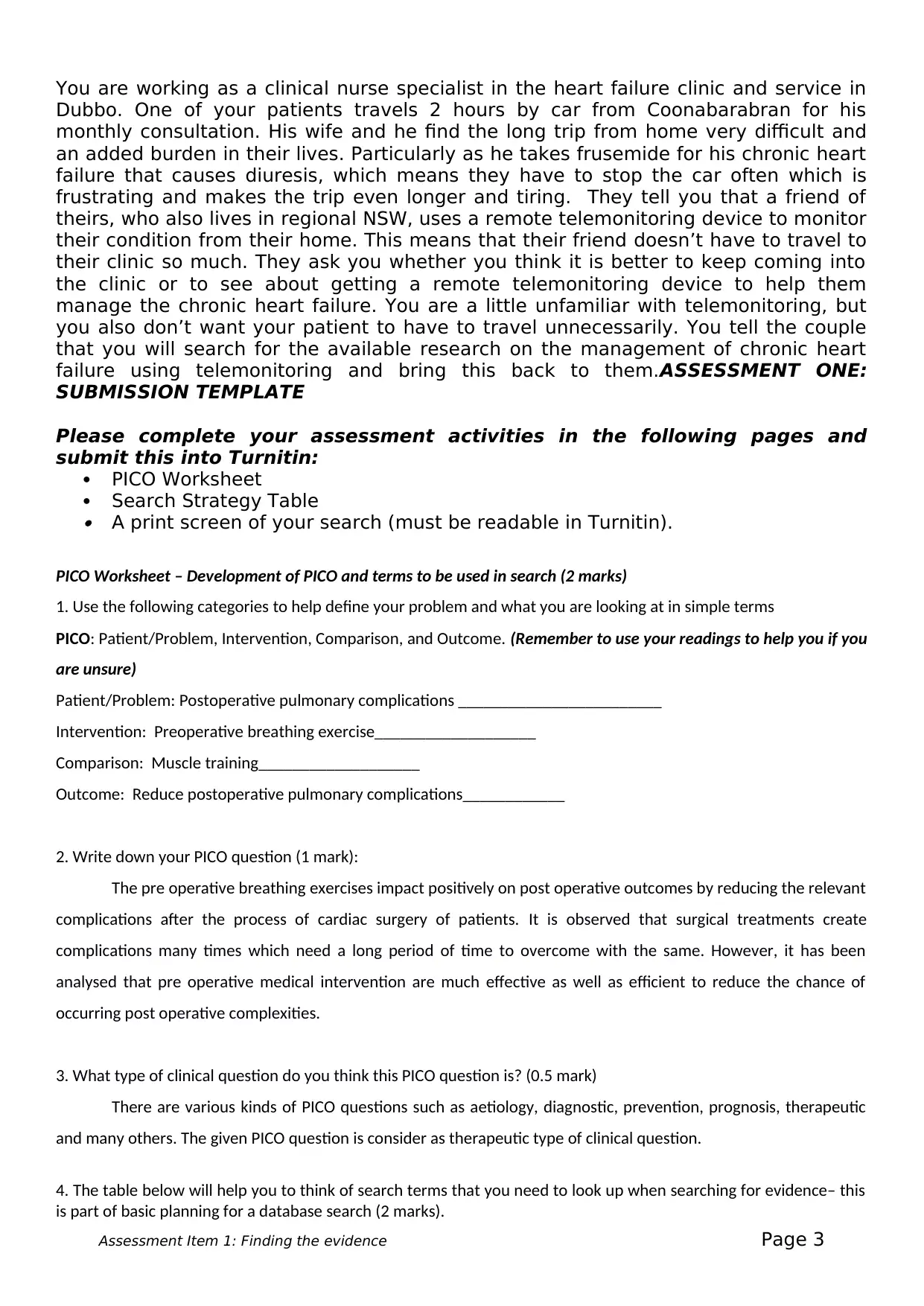
You are working as a clinical nurse specialist in the heart failure clinic and service in
Dubbo. One of your patients travels 2 hours by car from Coonabarabran for his
monthly consultation. His wife and he find the long trip from home very difficult and
an added burden in their lives. Particularly as he takes frusemide for his chronic heart
failure that causes diuresis, which means they have to stop the car often which is
frustrating and makes the trip even longer and tiring. They tell you that a friend of
theirs, who also lives in regional NSW, uses a remote telemonitoring device to monitor
their condition from their home. This means that their friend doesn’t have to travel to
their clinic so much. They ask you whether you think it is better to keep coming into
the clinic or to see about getting a remote telemonitoring device to help them
manage the chronic heart failure. You are a little unfamiliar with telemonitoring, but
you also don’t want your patient to have to travel unnecessarily. You tell the couple
that you will search for the available research on the management of chronic heart
failure using telemonitoring and bring this back to them.ASSESSMENT ONE:
SUBMISSION TEMPLATE
Please complete your assessment activities in the following pages and
submit this into Turnitin:
PICO Worksheet
Search Strategy Table A print screen of your search (must be readable in Turnitin).
PICO Worksheet – Development of PICO and terms to be used in search (2 marks)
1. Use the following categories to help define your problem and what you are looking at in simple terms
PICO: Patient/Problem, Intervention, Comparison, and Outcome. (Remember to use your readings to help you if you
are unsure)
Patient/Problem: Postoperative pulmonary complications ________________________
Intervention: Preoperative breathing exercise___________________
Comparison: Muscle training___________________
Outcome: Reduce postoperative pulmonary complications____________
2. Write down your PICO question (1 mark):
The pre operative breathing exercises impact positively on post operative outcomes by reducing the relevant
complications after the process of cardiac surgery of patients. It is observed that surgical treatments create
complications many times which need a long period of time to overcome with the same. However, it has been
analysed that pre operative medical intervention are much effective as well as efficient to reduce the chance of
occurring post operative complexities.
3. What type of clinical question do you think this PICO question is? (0.5 mark)
There are various kinds of PICO questions such as aetiology, diagnostic, prevention, prognosis, therapeutic
and many others. The given PICO question is consider as therapeutic type of clinical question.
4. The table below will help you to think of search terms that you need to look up when searching for evidence– this
is part of basic planning for a database search (2 marks).
Assessment Item 1: Finding the evidence Page 3
Dubbo. One of your patients travels 2 hours by car from Coonabarabran for his
monthly consultation. His wife and he find the long trip from home very difficult and
an added burden in their lives. Particularly as he takes frusemide for his chronic heart
failure that causes diuresis, which means they have to stop the car often which is
frustrating and makes the trip even longer and tiring. They tell you that a friend of
theirs, who also lives in regional NSW, uses a remote telemonitoring device to monitor
their condition from their home. This means that their friend doesn’t have to travel to
their clinic so much. They ask you whether you think it is better to keep coming into
the clinic or to see about getting a remote telemonitoring device to help them
manage the chronic heart failure. You are a little unfamiliar with telemonitoring, but
you also don’t want your patient to have to travel unnecessarily. You tell the couple
that you will search for the available research on the management of chronic heart
failure using telemonitoring and bring this back to them.ASSESSMENT ONE:
SUBMISSION TEMPLATE
Please complete your assessment activities in the following pages and
submit this into Turnitin:
PICO Worksheet
Search Strategy Table A print screen of your search (must be readable in Turnitin).
PICO Worksheet – Development of PICO and terms to be used in search (2 marks)
1. Use the following categories to help define your problem and what you are looking at in simple terms
PICO: Patient/Problem, Intervention, Comparison, and Outcome. (Remember to use your readings to help you if you
are unsure)
Patient/Problem: Postoperative pulmonary complications ________________________
Intervention: Preoperative breathing exercise___________________
Comparison: Muscle training___________________
Outcome: Reduce postoperative pulmonary complications____________
2. Write down your PICO question (1 mark):
The pre operative breathing exercises impact positively on post operative outcomes by reducing the relevant
complications after the process of cardiac surgery of patients. It is observed that surgical treatments create
complications many times which need a long period of time to overcome with the same. However, it has been
analysed that pre operative medical intervention are much effective as well as efficient to reduce the chance of
occurring post operative complexities.
3. What type of clinical question do you think this PICO question is? (0.5 mark)
There are various kinds of PICO questions such as aetiology, diagnostic, prevention, prognosis, therapeutic
and many others. The given PICO question is consider as therapeutic type of clinical question.
4. The table below will help you to think of search terms that you need to look up when searching for evidence– this
is part of basic planning for a database search (2 marks).
Assessment Item 1: Finding the evidence Page 3
⊘ This is a preview!⊘
Do you want full access?
Subscribe today to unlock all pages.

Trusted by 1+ million students worldwide
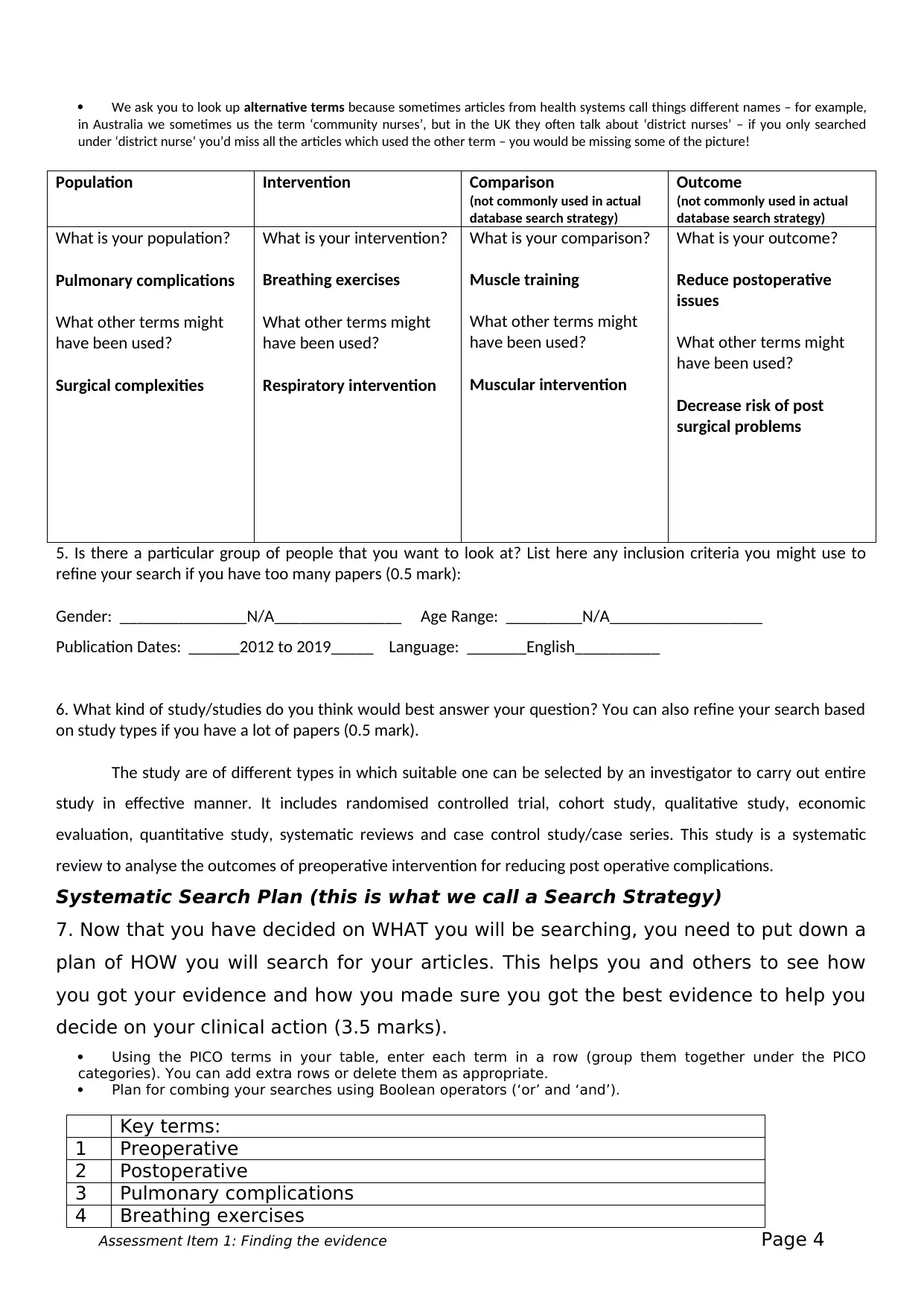
We ask you to look up alternative terms because sometimes articles from health systems call things different names – for example,
in Australia we sometimes us the term ‘community nurses’, but in the UK they often talk about ‘district nurses’ – if you only searched
under ‘district nurse’ you’d miss all the articles which used the other term – you would be missing some of the picture!
Population Intervention Comparison
(not commonly used in actual
database search strategy)
Outcome
(not commonly used in actual
database search strategy)
What is your population?
Pulmonary complications
What other terms might
have been used?
Surgical complexities
What is your intervention?
Breathing exercises
What other terms might
have been used?
Respiratory intervention
What is your comparison?
Muscle training
What other terms might
have been used?
Muscular intervention
What is your outcome?
Reduce postoperative
issues
What other terms might
have been used?
Decrease risk of post
surgical problems
5. Is there a particular group of people that you want to look at? List here any inclusion criteria you might use to
refine your search if you have too many papers (0.5 mark):
Gender: _______________N/A_______________ Age Range: _________N/A__________________
Publication Dates: ______2012 to 2019_____ Language: _______English__________
6. What kind of study/studies do you think would best answer your question? You can also refine your search based
on study types if you have a lot of papers (0.5 mark).
The study are of different types in which suitable one can be selected by an investigator to carry out entire
study in effective manner. It includes randomised controlled trial, cohort study, qualitative study, economic
evaluation, quantitative study, systematic reviews and case control study/case series. This study is a systematic
review to analyse the outcomes of preoperative intervention for reducing post operative complications.
Systematic Search Plan (this is what we call a Search Strategy)
7. Now that you have decided on WHAT you will be searching, you need to put down a
plan of HOW you will search for your articles. This helps you and others to see how
you got your evidence and how you made sure you got the best evidence to help you
decide on your clinical action (3.5 marks).
Using the PICO terms in your table, enter each term in a row (group them together under the PICO
categories). You can add extra rows or delete them as appropriate.
Plan for combing your searches using Boolean operators (‘or’ and ‘and’).
Key terms:
1 Preoperative
2 Postoperative
3 Pulmonary complications
4 Breathing exercises
Assessment Item 1: Finding the evidence Page 4
in Australia we sometimes us the term ‘community nurses’, but in the UK they often talk about ‘district nurses’ – if you only searched
under ‘district nurse’ you’d miss all the articles which used the other term – you would be missing some of the picture!
Population Intervention Comparison
(not commonly used in actual
database search strategy)
Outcome
(not commonly used in actual
database search strategy)
What is your population?
Pulmonary complications
What other terms might
have been used?
Surgical complexities
What is your intervention?
Breathing exercises
What other terms might
have been used?
Respiratory intervention
What is your comparison?
Muscle training
What other terms might
have been used?
Muscular intervention
What is your outcome?
Reduce postoperative
issues
What other terms might
have been used?
Decrease risk of post
surgical problems
5. Is there a particular group of people that you want to look at? List here any inclusion criteria you might use to
refine your search if you have too many papers (0.5 mark):
Gender: _______________N/A_______________ Age Range: _________N/A__________________
Publication Dates: ______2012 to 2019_____ Language: _______English__________
6. What kind of study/studies do you think would best answer your question? You can also refine your search based
on study types if you have a lot of papers (0.5 mark).
The study are of different types in which suitable one can be selected by an investigator to carry out entire
study in effective manner. It includes randomised controlled trial, cohort study, qualitative study, economic
evaluation, quantitative study, systematic reviews and case control study/case series. This study is a systematic
review to analyse the outcomes of preoperative intervention for reducing post operative complications.
Systematic Search Plan (this is what we call a Search Strategy)
7. Now that you have decided on WHAT you will be searching, you need to put down a
plan of HOW you will search for your articles. This helps you and others to see how
you got your evidence and how you made sure you got the best evidence to help you
decide on your clinical action (3.5 marks).
Using the PICO terms in your table, enter each term in a row (group them together under the PICO
categories). You can add extra rows or delete them as appropriate.
Plan for combing your searches using Boolean operators (‘or’ and ‘and’).
Key terms:
1 Preoperative
2 Postoperative
3 Pulmonary complications
4 Breathing exercises
Assessment Item 1: Finding the evidence Page 4
Paraphrase This Document
Need a fresh take? Get an instant paraphrase of this document with our AI Paraphraser
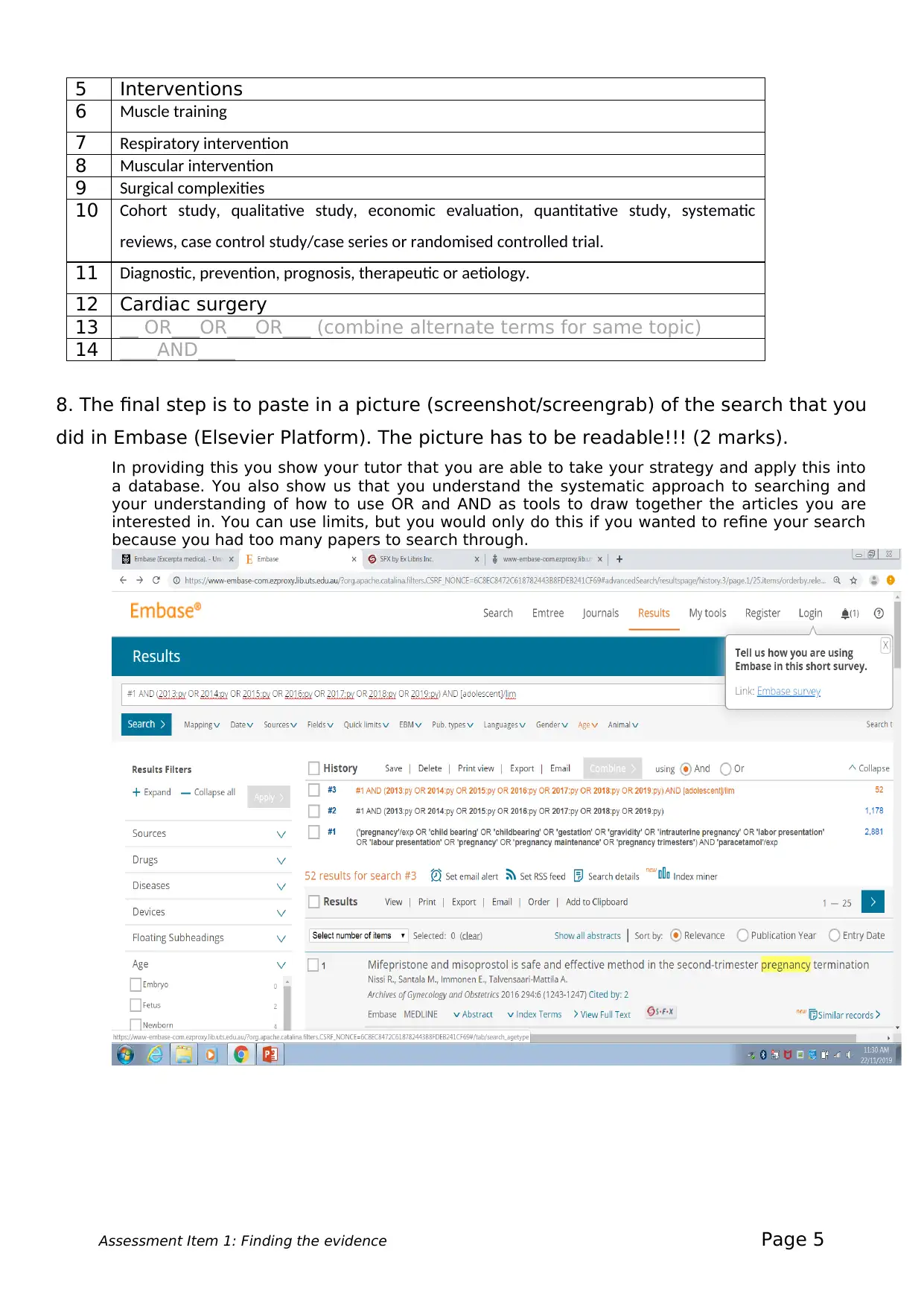
5 Interventions
6 Muscle training
7 Respiratory intervention
8 Muscular intervention
9 Surgical complexities
10 Cohort study, qualitative study, economic evaluation, quantitative study, systematic
reviews, case control study/case series or randomised controlled trial.
11 Diagnostic, prevention, prognosis, therapeutic or aetiology.
12 Cardiac surgery
13 __ OR___OR___OR___ (combine alternate terms for same topic)
14 ____AND____
8. The final step is to paste in a picture (screenshot/screengrab) of the search that you
did in Embase (Elsevier Platform). The picture has to be readable!!! (2 marks).
In providing this you show your tutor that you are able to take your strategy and apply this into
a database. You also show us that you understand the systematic approach to searching and
your understanding of how to use OR and AND as tools to draw together the articles you are
interested in. You can use limits, but you would only do this if you wanted to refine your search
because you had too many papers to search through.
Assessment Item 1: Finding the evidence Page 5
6 Muscle training
7 Respiratory intervention
8 Muscular intervention
9 Surgical complexities
10 Cohort study, qualitative study, economic evaluation, quantitative study, systematic
reviews, case control study/case series or randomised controlled trial.
11 Diagnostic, prevention, prognosis, therapeutic or aetiology.
12 Cardiac surgery
13 __ OR___OR___OR___ (combine alternate terms for same topic)
14 ____AND____
8. The final step is to paste in a picture (screenshot/screengrab) of the search that you
did in Embase (Elsevier Platform). The picture has to be readable!!! (2 marks).
In providing this you show your tutor that you are able to take your strategy and apply this into
a database. You also show us that you understand the systematic approach to searching and
your understanding of how to use OR and AND as tools to draw together the articles you are
interested in. You can use limits, but you would only do this if you wanted to refine your search
because you had too many papers to search through.
Assessment Item 1: Finding the evidence Page 5
1 out of 5
Related Documents
Your All-in-One AI-Powered Toolkit for Academic Success.
+13062052269
info@desklib.com
Available 24*7 on WhatsApp / Email
![[object Object]](/_next/static/media/star-bottom.7253800d.svg)
Unlock your academic potential
Copyright © 2020–2026 A2Z Services. All Rights Reserved. Developed and managed by ZUCOL.





